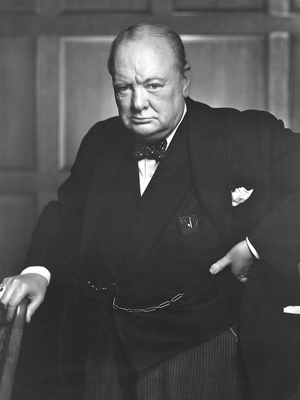
Winston Churchill was a pillar of stability for democracy, celebrated author, Freemason, and Prime Minister of the United Kingdom during World War II.
Considered one of the most sublime British statesmen, Brother Winston Leonard Spencer Churchill was a pillar of strength and stability for democracy during the dark days of World War II. A celebrated author and beloved Prime Minister of the U.K. (1940 – 45, 1951 – 55), Brother Churchill’s tenacity and unfailing attitude demonstrated his Masonic training on the world’s stage. Following WWII, he received two major accomplishments in 1953: investiture as a Knight of the Garter and recognition as a Nobel Prize winner in Literature.
Churchill faced adversity even at the very beginning of his life – born two months premature in Oxfordshire on November 30, 1874. By his own admission, Churchill struggled in school, particularly in mathematics. Although far from the top of his class, he excelled grammar, rhetoric, and logic – skills which served him substantially in his political career. His six-volume anthology on World War II, particularly the first book titled The Gathering Storm, is masterful historical prose. With eloquence, Churchill narrates his experience during the war with sharp imagery and poetic grace: “It is where the balance quivers, and the proportions are veiled in mist, that the opportunity for world-saving decisions presents itself.”
During the time Churchill was considering joining, Freemasonry was viewed a fashionable and popular social pursuit. Receiving positive publicity, Freemasons were recognized and revered in their local communities. Following popular sentiment, Winston applied for membership and was initiated into the Studholme Lodge No. 1591 on May 24, 1901. Although he did not hold Masonic office, Brother Churchill was faithful and regular attendee of lodge meetings for more than a decade. Resigning from his lodge in 1912, Churchill attempted to form a new lodge in 1918 – the Ministry of Munitions Lodge. When the petition was rejected, his masonic participation dwindled to the rare visit to a lodge, such as Royal Naval Lodge No. 59 in 1928. Yet, Brother Churchill’s early masonic education and training clearly developed key virtues necessary for great leadership – temperance, fortitude, prudence, and justice – which ultimately benefited humanity by preserving liberty and equality for future generations.
Quick Links
Address
Hexham Masonic Hall
7 Westfield Terrace
Hexham
NE46 3DJ
